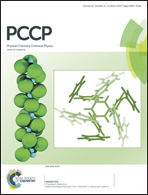Lower critical solution temperature (LCST) phase separation of glycol ethers for forward osmotic control†
Abstract
Lower critical solution temperature (LCST) phase transition of glycol ether (GE)–water mixtures induces an abrupt change in osmotic pressure driven by a mild temperature change. The temperature-controlled osmotic change was applied for the forward osmosis (FO) desalination. Among three GEs evaluated, di(ethylene glycol) n-hexyl ether (DEH) was selected as a potential FO draw solute. A DEH–water mixture with a high osmotic pressure could draw fresh water from a high-salt feed solution such as seawater through a semipermeable membrane at around 10 °C. The water-drawn DEH–water mixture was phase-separated into a water-rich phase and a DEH-rich phase at around 30 °C. The water-rich phase with a much reduced osmotic pressure released water into a low-salt solution, and the DEH-rich phase was recovered into the initial DEH–water mixture. The phase separation behaviour, the residual GE concentration in the water-rich phase, the osmotic pressure of the DEH–water mixture, and the osmotic flux between the DEH–water mixture and salt solutions were carefully analysed for FO desalination. The liquid–liquid phase separation of the GE–water mixture driven by the mild temperature change between 10 °C and 30 °C is very attractive for the development of an ideal draw solute for future practical FO desalination.


 Please wait while we load your content...
Please wait while we load your content...